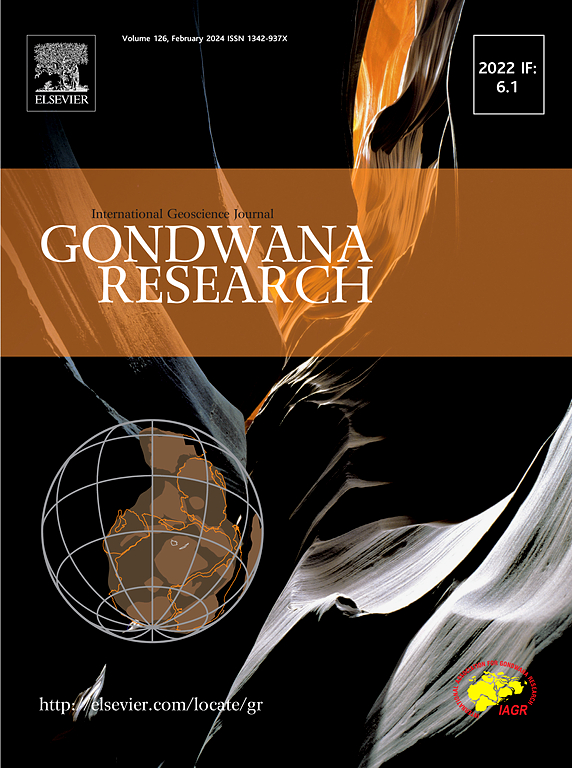一个由追求碳中和的欧洲经济体组成的新小组:当前的气候技术和可再生能源实践真的能通过可持续发展的棱镜吗?
IF 7.2
1区 地球科学
Q1 GEOSCIENCES, MULTIDISCIPLINARY
引用次数: 0
摘要
考虑到欧盟采用尖端技术和向绿色能源过渡的举措,当务之急是评估气候技术和可再生能源利用对其成员国环境可持续性的影响。本研究对气候技术和可再生能源消费对负荷能力系数(最全面的环境可持续性指标之一)的影响进行了新颖的评估,为现有文献做出了贡献。为此,该研究采用 "持续更新完全修正"(Cup-FM)和 "持续更新和偏差修正"(Cup-BC)方法,对 1990 年至 2021 年的数据进行了研究,重点关注对可再生能源最具吸引力的五个欧盟国家:德国、法国、西班牙、荷兰和丹麦。论文还考虑了经济增长、外国直接投资和城市化对生态的影响。结果显示,气候技术与生态质量之间存在负相关关系。可再生能源消费与生态福祉之间呈现出正相关,但在统计上并不显著,而经济增长、外国直接投资和城市化则对生态质量产生了不利影响。与普遍的说法相反,这些惊人的观察结果表明,可再生能源消费和气候技术还不具备应对全球气候之战的能力。本报告深入探讨了这些结果背后的根本原因,并提出了针对可持续发展目标 7 和 13 的战略,以促进清洁能源和绿色技术的研究与开发,实现可持续发展的未来。本文章由计算机程序翻译,如有差异,请以英文原文为准。

A novel panel of European economies pursuing carbon neutrality: Do current climate technology and renewable energy practices really pass through the prism of sustainable development?
Given the European Union’s initiatives to embrace cutting-edge technologies and transition to greener energy sources, it is imperative to assess the influence of climate technology and renewable energy utilization on the environmental sustainability of its member states. This study contributes to the existing body of literature by undertaking a novel assessment of the implications of climate technology and renewable energy consumption on load capacity factor, one of the most encompassing environmental sustainability indicators. To this end, the study examines data from 1990 to 2021 employing the “Continuously Updated Fully Modified” (Cup-FM) and “Continuously Updated and Bias-Corrected” (Cup-BC) approaches, concentrating on the five most attractive European Union countries for renewable energy: Germany, France, Spain, the Netherlands, and Denmark. The paper also considers the ecological impacts of economic growth, foreign direct investment, and urbanization. The results reveal a negative relationship between climate technology and ecological quality. While renewable energy consumption exhibits a positive but statistically insignificant association with ecological well-being, economic growth, foreign direct investment, and urbanization are found to have detrimental effects on ecological quality. In opposition to widely held claims, these striking observations suggest that renewable energy consumption and climate technology are not yet well equipped to fight the global climate battle. The underlying reasons behind these outcomes are thoroughly discussed, and strategies targeting Sustainable Development Goals 7 and 13 are proposed to catalyze advancements in research and development of cleaner energy and green technologies for a sustainable future.
求助全文
通过发布文献求助,成功后即可免费获取论文全文。
去求助
来源期刊

Gondwana Research
地学-地球科学综合
CiteScore
12.90
自引率
6.60%
发文量
298
审稿时长
65 days
期刊介绍:
Gondwana Research (GR) is an International Journal aimed to promote high quality research publications on all topics related to solid Earth, particularly with reference to the origin and evolution of continents, continental assemblies and their resources. GR is an "all earth science" journal with no restrictions on geological time, terrane or theme and covers a wide spectrum of topics in geosciences such as geology, geomorphology, palaeontology, structure, petrology, geochemistry, stable isotopes, geochronology, economic geology, exploration geology, engineering geology, geophysics, and environmental geology among other themes, and provides an appropriate forum to integrate studies from different disciplines and different terrains. In addition to regular articles and thematic issues, the journal invites high profile state-of-the-art reviews on thrust area topics for its column, ''GR FOCUS''. Focus articles include short biographies and photographs of the authors. Short articles (within ten printed pages) for rapid publication reporting important discoveries or innovative models of global interest will be considered under the category ''GR LETTERS''.
 求助内容:
求助内容: 应助结果提醒方式:
应助结果提醒方式:


